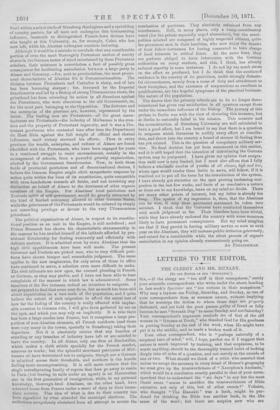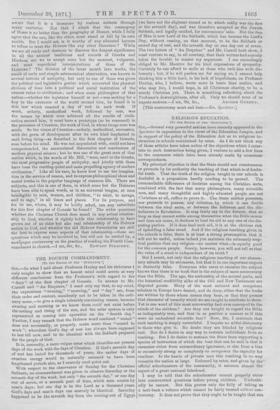LETTERS TO THE EDITOR.
THE CLERGY AND MR. IIUXLEY.
[To THE EDITOR OF THE SPEOTITOR.1
SIR, —If the clergy are "too stiff in their mumpsimus," surely your scientific correspondents who write under the above heading in last week's Spectator are "too curious in their sumpsimus." Why may a layman use Friday, Saturday, and Sunday, as one of your correspondents does, as common names, without implying that he worships the deities to whom those days are properly dedicated, and yet hold the poor parson guilty of fraud or folly because he uses "Seventh Day" to mean Sunday, and not Saturday? Your correspondent's argument reminds me of that of the old woman in "Guesses at Truth," who thanked God for His goodness in putting Sunday at the end of the week, when He might have put it in the middle, and so made a broken week of it.
Your other correspondent, who is "perhaps naturally of a sceptical turn of mind," will, I hope, pardon me if I suggest that nature is much improved by training, and that sceptioism, to be worth anything, should be the thoroughly trained habit of looking deeply into all sides of a question, and not merely at the outside of one or two. What should we think of a critic who asserted that unless we accept the accuracy in every detail of Homer's geography we must give up the trustworthiness of" Xenophon's Anabasis," which would be a conclusion exactly parallel to that of your corre- spondent that to understand the "six days "in any but the most literal sense "seems to sacrifice the trustworthiness of Bible narrative not only of this, but of other events ?" Voltaire, who thought "The Hamskit " was a book, might be par- doned for thinking the Bible was another book, in the like sense of the word ; but there are sceptics now who are aware that it is a literature by various authors through many centuries. Not that I admit that the cosmogony of Moses is no better than the geography of Homer, while I fully agree that the one, like the other, must stand or fall by its own merits. But I would ask, is it worthy of any educated layman to refuse to treat the Hebrew like any other literature ? While we are all ready and desirous to discover the deepest significance in all the ancient traditions and records of Greeks and Hindoos, are we to accept none but the meanest, vulgarest, and • most superficial interpretations of those of the Hebrews? The division of the lunar month into weeks, the tresult of early and simple astronomical observation, was known to several nations of antiquity, but only to one of these was given the political and legislative genius which converted this physical 'division of time into a political and social institution of the 'utmost value to civilization ; and when some philosopher of that nation—whether the legislator himself or not—was seeking for a key to the existence of the world around him, he found it in this law which enacted a day of rest in each week. If work, orderly, methodical work, followed by rest, was the means by which man achieved all the results of civili- .zation around him, it must have a prototype (so he reasoned) in the processes of Creation, the work of God, in whose image man was made. So the vision of Creation—orderly, methodical, successive, with the germ of development after its own kind implanted in each living thing—as described in the first chapter of Genesis, rose before his mind. He was not acquainted with, could not have comprehended, the accumulated discoveries and conclusions of anodern physical science ; but he was one of the great men of that
ation which, in the words of Mr. Mill, "were, next to the Greeks, the most progressive people of antiquity, and jointly with them have been the starting-point and main propelling agency of modern civilization." Like all his race, he know how to use the imagina- tion in the service of reason, and to express philosophical ideas and moral truths, in the popular language of common life. There are ssubjects, and this is one of them, in which none but the Hebrews lave been able to speak words, as in an universal tongue, at once intelligible to men, women, and children, "to saint, to savage, And to sage," in all times and places. For its purpose, and for its use, where, it may be boldly asked, can any substitute for this first chapter of Genesis be found? The wider questions 'whether the Christian Church does stand in any actual relation- ship to God, whether it rightly holds this relationship to have grown out of an older but also real relationship of the Hebrew 'nation to God, and whether the old Hebrew formularies are still 'the best to express some aspects of that relationship—these are questions which may be involved in, but will not be settled by, a anandtnent in church.—I am, Sir, &C., EDWARD STRACHEY.



































 Previous page
Previous page